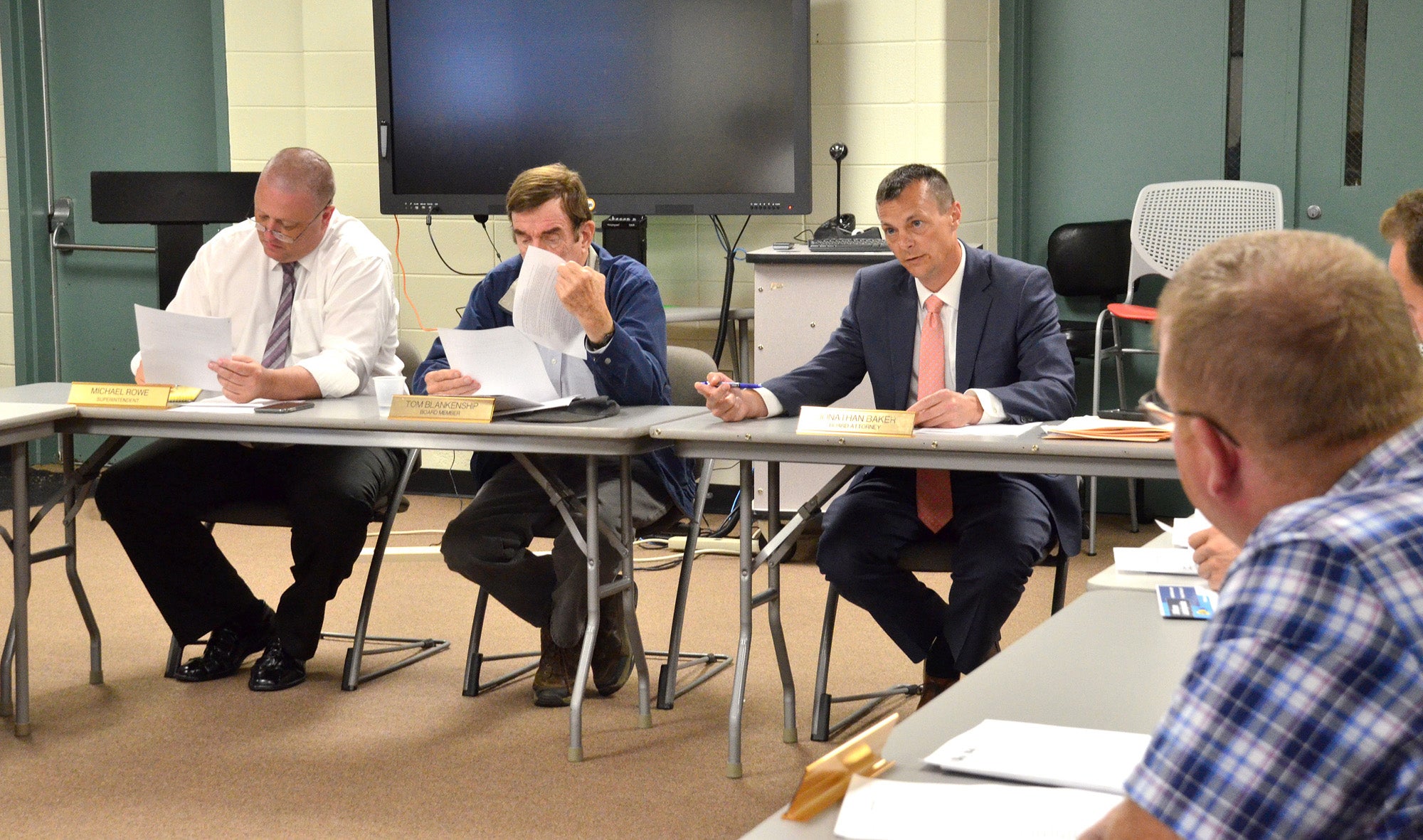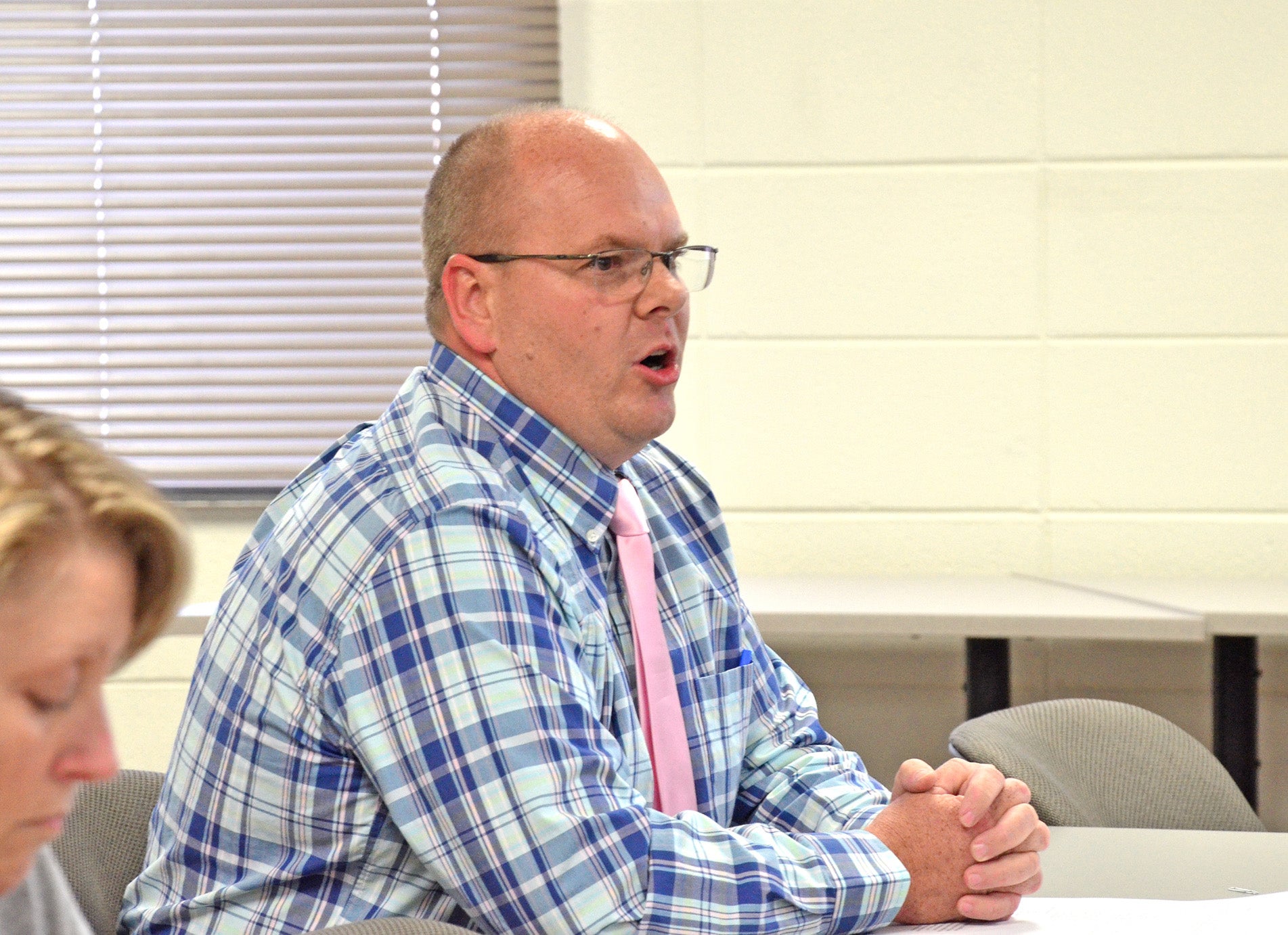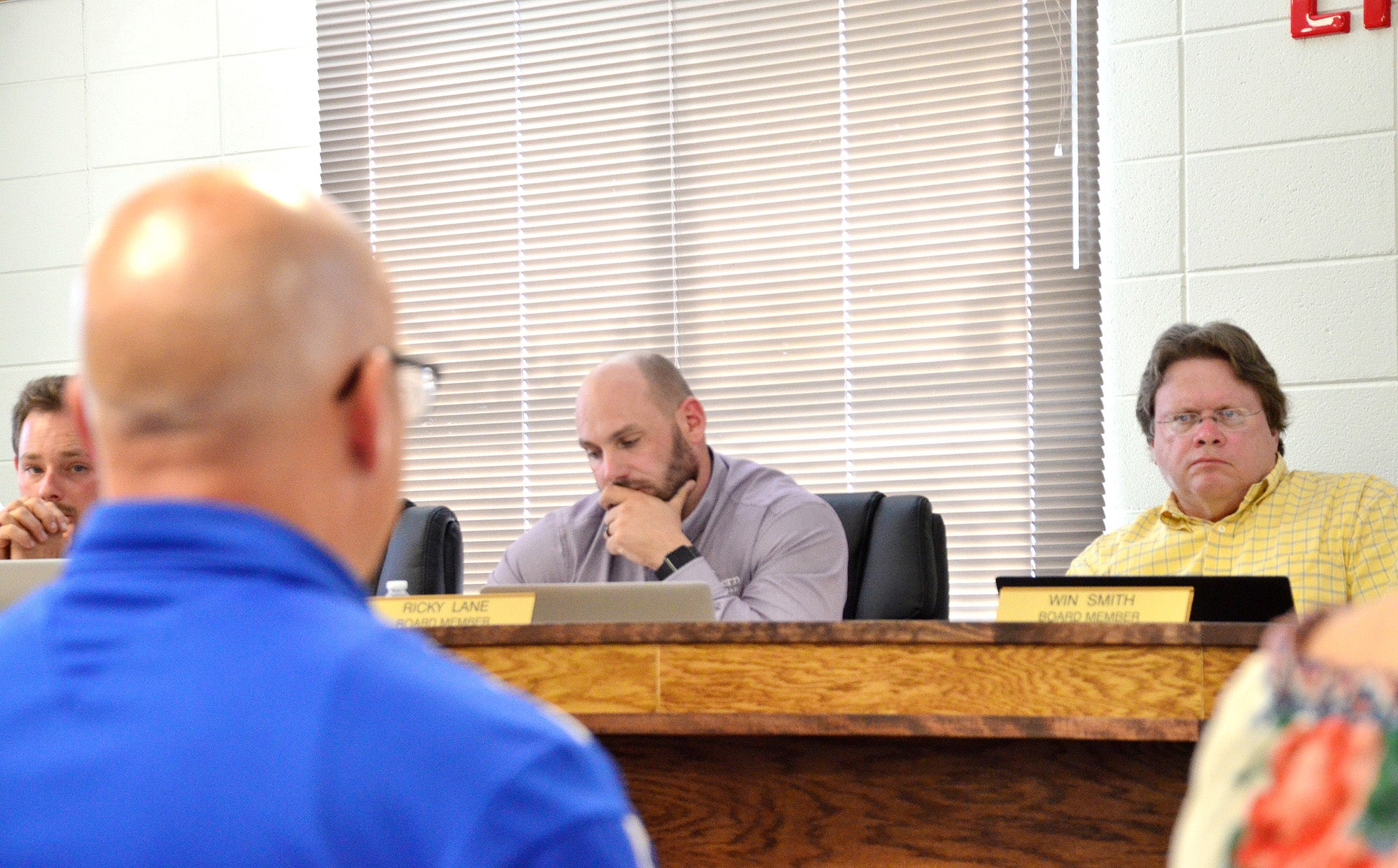School Board hears appeal on implementation of Summit Learning at LCMS
Published 12:41 pm Thursday, June 13, 2019
|
Getting your Trinity Audio player ready...
|
STANFORD — Over the past few months, protests from parents regarding the mandatory implementation of the Summit Learning curriculum at Lincoln County Middle School in the 2019-20 school year have circulated throughout the community and been the topic of a Facebook page and newsprint and television stories.
The Facebook page “Lincoln County Parents and Teachers Against Summit Learning” has drawn over 240 followers and urges followers to approach their board members to request they “Make Summit Voluntary.” On May 16, some parents opted to keep their children out of school for the day to make clear their protest of the mandatory implementation.
On Tuesday, the members of the Lincoln County Board of Education had the issue brought formally before them in a special called meeting, as they listened to an appeal on the LCMS’ School-Based Decision Making Council’s decision to make Summit Learning mandatory school-wide.
According to the Summit Learning website, the program was developed by teachers to “help students connect their long-term goals to their daily actions” and that students “move at their own pace to learn skills, apply those skills to real-world projects and reflect on their learning.” Among the complaints of the online program, which is free, are that the learning platform requires too much computer screen time, it makes it easy to cheat by looking up answers online, teachers are not dedicating enough classroom instruction and that it invades student privacy.
Anthony Potts, who will have a student at LCMS in the fall, does not approve of the program for his child and he filed the appeal to have the council’s vote, which was made in March, overturned. He had filed an appeal immediately after the vote but, after his appeal was denied and after speaking to Superintendent Michael Rowe, Potts brought his appeal to the board.
As he voiced his appeal, Potts’ primary bone of contention centered around the data being submitted to Summit.
“Originally researching Summit Learning, the thing that stood out to me was the amount of data that our school system is required to submit to Summit on behalf of our students,” he said, noting that Summit admitted to the ability to share the information with whomever they deemed a service provider. “This is personal information, including our students’ names, email addresses, parents’ phone numbers, ethnicity, socio-economic standards, even IEPs and 504s.”
“Not only does Summit require us to turn over that information to them, they also collect information automatically on every device, whether it be a phone, tablet or computer, that ever logs into Summit. They do this through a technology such as Cookies, something Facebook’s very familiar with. It doesn’t matter if it’s the student’s device, the parent’s device or the teacher’s device. Once you are logged in, even if you log out, they are constantly monitoring and tracking information on those devices.”
Potts related that in the platform policy, Summit admits that if anything is done to disable or delete the technologies that would prevent them from tracking users “we can no longer use their service or that their service may not be available.” Which led him to ask, “What is the educational purpose of them being able to track all this information on parents and teachers and even our students when not using the Summit?”
He is also worried about what happens to that data.
“I’ve been told that I should not worry about that because FERPA (Federal Educational Rights & Privacy Act) will protect our student data. However, that is not the case,” said Potts. “In 2008, FERPA was rewritten to allow schools to share data with third-party companies by designating them as a school official. In 2011, it was rewritten again to make it even easier to just designate them as authorized representatives. Therefore, we have no protection of our students’ personal data. That personal data Summit takes and can use however they see fit.”
The lack of research evidence and facts to support the claim of Summit being a big success was also a concern for Potts, as well as other parents.
“If you look at the research on Summit, you will find that they claim to be backed by Harvard. Harvard has denied this,” said Potts. “Harvard says they did work to plan an evaluation but that Summit backed out of the evaluation. So, if you go to look for other information and research that shows that Summit does what it says it does, you’ll find none.”
After finding no third-party independent research to validate Summit as being a successful tool to use at LCMS, Potts looked to the school and the data provided via webinars. And he had questions concerning that data.
“The data that the middle school has provided in their webinars shows that Team Patriots has outperformed Team Yankees and Patriots use Summit Learning,” he said. “However, what we fail to understand is, if those same kids’ scores were looked at last year, was Team Patriots already outperforming Team Yankees? If we look at Team Patriots’ scores last year compared to them this year, did they have an improvement? Or is it simply the fact that they were already more advanced students and Summit had nothing to do with the progress? We’re basing this on a six-month window of opportunity that the middle school used in a pilot project.”
In his final argument against the mandatory implementation of Summit Learning, Potts said there had been instances of inappropriate material popping up on Summit.
“In Cheshire, Connecticut last year, a board member was going to call a vote to cancel Summit for inappropriate material, but the superintendent issued an executive order stopping Summit before the vote because of the inappropriate material,” he said. “Parents complained that there were ads for sexual lubricants. The social studies module had a statue from Greece of a naked man having sex with a goose captioned, ‘Sex with a goose.’ These types of things happen in Summit and people are upset.”
He noted that LCMS has admitted to “not having the technology to prevent inappropriate material from reaching our children,” but commended them on working to rectify that problem.
Potts became accusatory as he neared the end of his appeal, claiming his appeal to the council was pushed aside.
“As far as the appeal process, the Lincoln County Board of Education policy states that an appeal must first be reviewed by the school council. I can tell you that didn’t happen,” he said. “I received an email during the day on April 16 that I would be receiving a certified letter that had been mailed dated April 12 denying my appeal. This council meeting wasn’t til after school on April 16. There is no way the council had an opportunity to review the appeals, comment on the appeals and then make a ruling on the appeals.”
He went on to claim LCMS principal Billy Harris pressured teachers and voting members of the council to make Summit mandatory.
“Not only does this violate Lincoln County’s policy, it could also violate Kentucky Statute 16345 because the principal acted alone and circumvented the council at that time,” Potts said. “In all honesty, I don’t think the council actually reviewing the appeal would have mattered. And the reason I say that is because by the time the appeal had come out a memo was sent to the staff and teachers, including those voting members of the council, basically threatening them against liking a page for parents and teachers against Summit or for speaking out publicly against Summit Learning. I believe that would be enough circumstantial evidence that the Kentucky Office of Education Accountability would like to review that because what is the point of having a site-based decision council if administration can pressure teachers and voting members of that council to vote a certain way.”
As he concluded his appeal, Potts did not ask for LCMS to abandon Summit but to basically make it a choice.
“All I’m asking for is the option, as a parent, to make the decision whether Summit would work for my child. Whether I am willing to sacrifice my child’s personal data and my child’s privacy to use Summit,” he said. “There may be parents who feel that Summit is right for their child. That is their right. What I am asking for is the right to determine if Summit is right for my child.”
After listening to Potts’ appeal, principal Billy Harris got his turn to address the board. He explained that he was under the impression that he was responding to the original appeal in which he said Potts “went way off kilter” and that would be the appeal he would respond to.
Immediately, Harris said that Potts’ claim that members of the council were pressured to vote Summit through was “just not true.”
“Mr. Potts never attended a site-based council meeting. He never came to school to talk to me one-on-one. He never reached out to me other than an appeal after the decision had been made with my site-based council,” Harris said. “He said that no members were given a chance to look at the appeal or read or review the appeal. Again, that’s untrue. They were given the opportunity to have input on the letter that he received. He doesn’t know the timeline of when things went down. The members were given the chance to discuss the appeal and the response to the appeals and no further discussion was brought up at the site-based meeting.”
Harris said the public is always allowed the opportunity to speak at the site-based meetings, but that no parents signed up to speak that night.
As per Potts’ privacy concerns, Harris turned the floor over to Rachel Yaden, instructional coach at LCMS.
“I have heard about the privacy concerns since the March meeting and I’ve done a lot of research on privacy policies from what we use here as this district as well as what our students use, including things like Snapchat and Facebook,” said Yaden. “Summit policy does comply with FERPA. It also complies with COPA, which is for those students who are under 13, and that is a lot of our students themselves.”
“I also researched about Cookies because I know that was a big concern with that data tracking. The programs that we use here in our district that use Cookies include STEMscopes, Summit, Infinite Campus, Google and BrainPop. So they use Cookies. They use data tracking. Now Infinite Campus is one that is required by the state that every district uses.”
Yaden went on to say that Summit does not share any information.
“We don’t allow it to collect. We did not allow Summit this year to collect any information about demographics, anything about subgroups, anything about IEPs, 504s, ethnicity, race, language,” she said. “We did not allow any of it to be collected by Summit – none of it – because we felt that is ours and an extra layer of protection we have here at the district. The reason they ask for the information is simply to make their services better, to better serve the students, to serve the teachers.”
While addressing Potts and the board, Yaden provided some LCMS hard data comparing the Summit team against the non-Summit team. But in transparency, she did explain that the data was automatically skewed because the teams were lopsided, with the majority of the school’s exceptional child population on one team.
“In the CERT test (College Equipped Readiness Tool), 55 percent who met benchmark were on the Summit team, 47 percent who met benchmark were on the non-Summit team,” said Yaden. “Of those who had met benchmark, 83 percent who were over the benchmark were Patriots on the Summit team and 80 percent who were over were on the non-Summit team – which was great. That is great information.”
In LCMS’ other diagnostic test throughout the year, IReady in reading and in math, Yaden reported good numbers as well.
“The end-of-the-year results are for the students who were on grade level in the eighth grade, 83 students were on grade level, and of those 83 students, 78 percent of them were on the Summit team, which means they know how to think critically and find the evidence because that’s what’s asked of them on IReady in reading,” she said. “In math … 90 of our students were on grade level and 53 percent of those students were Summit students. To me, that’s pretty compelling data that what the teachers are using those resources for in addition to research-based and base practices, that is working with our students.”
Harris stepped back before the board to respond to Potts’ claim in the fourth paragraph of the original appeal, which said that neither himself nor Mr. Rowe addressed any concerns surrounding Summit Learning platform results.
“Again, Mr. Potts never has asked to come in and speak to me personally. Never have I set up a meeting. I’ve talked with a few other parents about Summit Learning and some of the things we’re hoping to bring to our students. Again, never Mr. Potts,” he said. “Our IReady results do show growth in our students. Yes, and even those students that are part of the Summit Learning team show growth and we look at growth a lot with our students because our students come into Lincoln County Middle School two to three levels behind in math and reading. A lot of our students do so we look at growth a lot. Are they up to grade level yet? No, they are not because they did not come in on grade level, but they are showing growth throughout the year. I have all the faith in the world in our students that if we set expectations for them that they are going to strive to meet them.”
Before Harris concluded his response, he addressed the final paragraph of the original appeal that questioned the leadership abilities of Superintendent Michael Rowe and himself.
“It says that Mr. Rowe failed to address concerns and Mr. Potts said he was concerned about the leadership of the school and district about pressuring site-based decision making councils to vote a certain way and sending memos,” he said. “True, I did send a memo, but the memo just simply said … I talked to each PLC, which is the teacher groups that meet during the day at the middle school, each teacher group about not talking negatively about the school out in public. It doesn’t shed a good light on our school system and it doesn’t shed a good light on their profession.”
As to the statement that he was being unethical, Harris didn’t mince word.
“I’ve never been unethical in my job. Again, Mr. Potts doesn’t know about the daily workings of my job and what it takes in order to run a school. I’ve been in this business for 27 years and I’ve never been unethical in my job,” he said. “I’ve never done things that are not in the best interest of students. I’m very capable of doing my job and doing it very well. I do talk to all of my teachers at all times. I do talk to all my teachers before decisions are made. I’m not someone to jump to a hasty decision. I always take everyone’s opinions and experiences into thought when I make those decisions.”
Several questions were posed by board members Win Smith, Alan Hubble, Ethan Jones, Ricky Lane and Tom Blankenship. One of the questions drawing the biggest response was Hubble’s question concerning inappropriate material popping up on Summit.
“I’m not here to testify, but I have heard and I have seen the picture of a lady with her breasts leaning over in a shirt wanting to talk to this child, and things like that popping up. Is that the case?” he asked.
There are no ads in Summit,” Yaden responded quickly. “It’s specifically stated in their privacy policy. There are no ads.”
Yaden mentioned just prior, when Jones asked if ads were in Summit, that there could be instances of ads popping up.
“I will say this, if a student has visited a site that has popups, the Cookies from that site will follow them,” she said. “It does not pop up, though, unless they have visited that site first.”
The board then adjourned to executive session to consider the appeal.
During the executive session, Harris extolled on the positives of Summit Learning.
“The positives about this program is that it is project-based learning which makes students go deeper into what they are learning in order to produce a project from what they’ve learned. It is a lot of inquiry-based learning. Students have to write and respond a lot to different questions and different aspects of projects they are doing,” he said. “There is a mentoring piece with this Summit Learning that is very important in that our students are setting academic goals. They set those goals every week and they meet with a teacher that is their mentor. It keeps them from falling behind. It keeps them on track. It keeps them focused on what it is that they need to do for the week or the days ahead of them. So that’s a very important part, especially at the middle school age.”
Harris also stressed that “our teachers are still teaching.”
“Our students are not just sitting in front of chromebooks all the time doing online learning. It is not that at all,” he said. “The teacher is in charge of the classroom.”
Kathy Peek, a parent who has expressed her disappointment in Summit being made mandatory, says her concerns with the program are the privacy issue, the self-paced approach and the way the program was implemented.
“My main concerns are privacy, what’s happening to that information once it leaves the classroom. Who is gaining access to it?” said Peek. “I don’t like the fact that Summit does not require parental consent for a student to participate. It states on their actual website and in their privacy policy that the school can act in place of the parent regarding to sign the student on. Now the state of Kentucky says, in order to share that data with a non-school official, that they do have to have parental consent. To my knowledge, they don’t consider Summit a school official. I think there are some huge privacy concerns and some huge legal concerns there.”
In regards to the self-paced teaching approach, Peek feels Summit may not be for middle-school aged kids.
“I do think that middle school children, for the most part, may lack the maturity physically, emotionally, psychologically to be self-directed learners. So I do worry about that,” she said. “I don’t think it’s for every child. I think that goes back to the point parents are wanting this to be optional. Last year’s parents were given the option and I feel like we should be extended the same courtesy.”
In the end, though, Peek is most bothered about how Summit Learning’s adoption occurred.
“We’re not talking about a change in resource or a change in instructional aid or a change in textbook. This is a drastic overhaul to the curriculum,” she said. “I do think that should have warranted parent notification. If they can send us something as trivial as sports tryouts or when Kona Ice comes to town … That warrants an all-call, so I felt like this should have warranted some notification to the parents.”
“It was mishandled all the way around. I felt like it could have been handled in a better manner to where parents were notified where they wouldn’t be receiving this backlash. It’s just the fact that they pretty much tried to alienate us from the entire process.”
Despite the Summit Learning issue, Peek’s positive attitude toward LCMS has not changed.
“I would like to say that I have nothing but great things to say about Lincoln County Middle School. My daughter has had two great years there,” she said. “I have no personal problems or any problems with the school. I have a problem with how this was handled and I have a problem with my choice being taken away.”
Upon the board’s return from executive session attorney Jonathan Baker said that no ruling would be made at that time. He announced that a ruling on the appeal will be made at a special called meeting on June 20 at 5:30 p.m. at the student support center.








